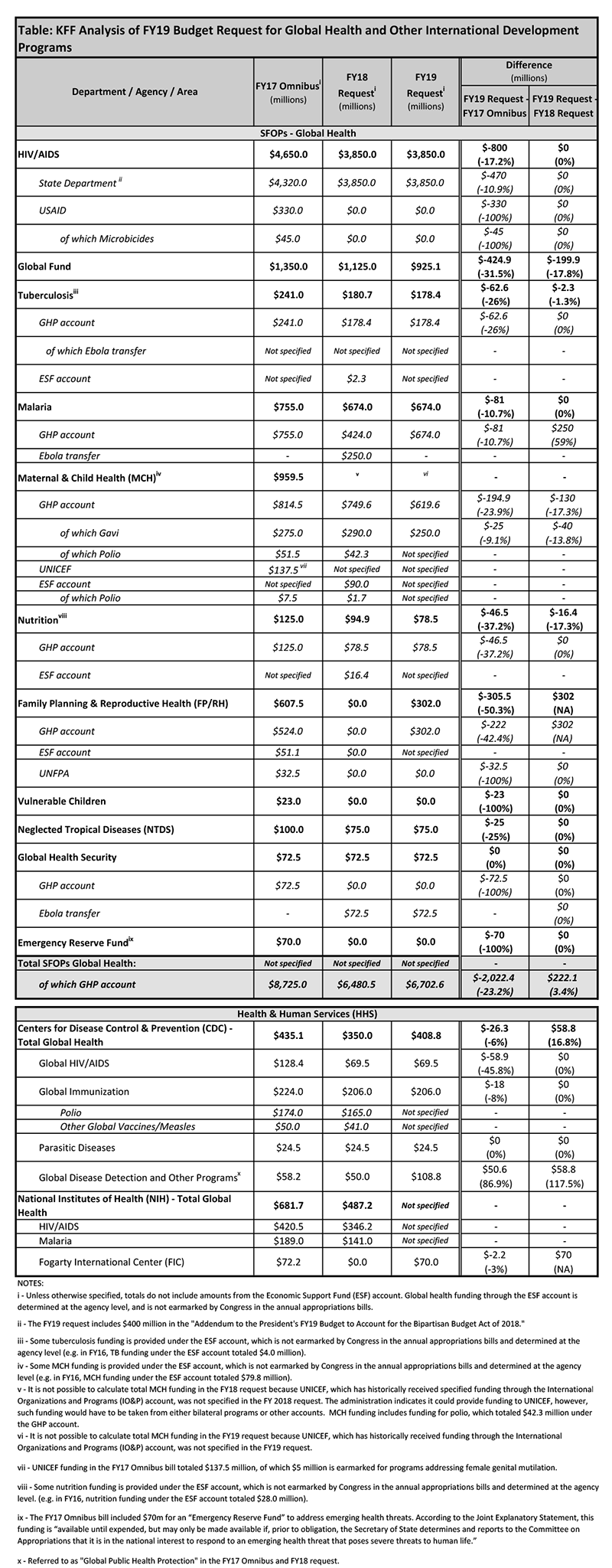White House Releases FY 2019 Budget Request
The White House released its FY 2019 budget request to Congress on February 12, 2018, which includes significant cuts to global health programs compared to FY 2017 enacted levels (the overall levels in the request are similar to the FY 2018 budget request).
Key highlights are as follows (see table for additional detail):
- Funding provided to the State Department and the U.S. Agency for International Development (USAID) (through the Global Health Programs account), which represents the bulk of global health assistance, would decline by more than $2 billion (-23%), from $8,725 million in FY 2017 to $6,703 million, which would be the lowest level of funding since FY 2007.
- Funding for global health provided to the Centers for Disease Control and Prevention (CDC) would decline by $26 million (-6%), from $435 million in FY 2017 to $409 million in FY 2019. However, funding for CDC’s Global Disease Detection and Other Programs, which supports the Global Health Security Agenda, would increase by $51 million (87%) compared to FY 2017 enacted levels, representing the only increase for global health programs in the FY 2019 request.
- Funding for the Fogarty International Center (FIC) at the National Institutes of Health (NIH) totaled $70 million, $2 million (-3%) below the FY 2017 enacted levels ($72 million); in the FY 2018 request, the administration had proposed to eliminate funding for FIC.
- Funding for almost all global health programs is reduced in the budget request compared to the FY17 enacted levels (totals represent funding through the Global Health Programs account, unless otherwise specified):
- Funding for bilateral HIV programs through the President’s Emergency Plan for AIDS Relief (PEPFAR) would decline overall by $859 million (-18%) including a decrease of $470 million (-11%) at State, $330 million (-100%) at USAID, and $59 million (-46%) at CDC.
- The U.S. contribution to the Global Fund to Fight AIDS, Tuberculosis and Malaria (Global Fund) would decline by $425 million (-32%).
- Funding for Family Planning and Reproductive Health (FP/RH) would decline by $305.5 million (-50%); in the FY 2018 request, the administration had proposed to eliminate funding for FP/RH.
- Funding would decrease for tuberculosis (-$63 million or –26%), malaria (-$81 million or -11%), maternal and child health (MCH) (-$195 million or -24%), Neglected Tropical Diseases (NTDs) (-$25 million or -25%), and nutrition (-$47 million or -37%).
- Gavi, the Vaccine Alliance, which is included under MCH funding, would decrease by $25 million (-9%).
- Funding for Global Health Security (GHS) at USAID is essentially flat at $72.5 million, although the funding is provided through a one-time transfer of $72.5 million in unspent emergency Ebola funding. Note: In addition to GHS funding, the FY 2017 Omnibus bill included $70 million for an Emergency Reserve Fund that could be used to address emerging public health threats, which remains available; the FY19 request did not include additional funding for the Emergency Reserve Fund.
- Funding for Global Immunization at CDC would decrease by $18 million (-8%).
- Funding for Parasitic Diseases and Malaria at CDC remains flat at $24.5 million.
Resources:
- White House FY 2019 Budget Resources
- Addendum to the President’s FY19 Budget to Account for the Bipartisan Budget Act of 2018
- State/USAID FY 2019 Congressional Budget Justification
- CDC FY 2019 Congressional Justification
The table (.xls) below compares the FY 2019 request to the FY 2017 enacted funding amounts as outlined in the “Consolidated Appropriations Act, 2017” (P.L. 115-31; KFF summary here) and the FY 2018 request (KFF summary here). Note that total funding for global health is not currently available as some funding provided through USAID, Health and Human Services (HHS), and the Department of Defense (DoD) is not yet available.
The KFF Daily Global Health Policy Report summarized news and information on global health policy from hundreds of sources, from May 2009 through December 2020. All summaries are archived and available via search.

